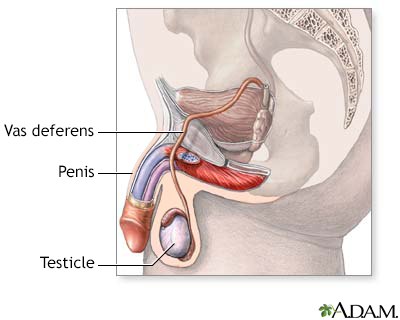Sertoli-Leydig cell tumor
Sertoli-stromal cell tumor; Arrhenoblastoma; Androblastoma; Ovarian cancer - Sertoli-Leydig cell tumor
Sertoli-Leydig cell tumor (SLCT) is a rare cancer of the ovaries. The cancer cells produce and release a male sex hormone called testosterone.

The male reproductive system, viewed from a sagittal section.
Causes
The exact cause of this tumor is not known. Changes (alterations) in genes may play a role.
SLCT occur most often in young women 20 to 30 years old. But the tumor can occur at any age.
Symptoms
The Sertoli cells are normally located in the male reproductive glands (the testes). They feed sperm cells. The Leydig cells, also located in the testes, release a male sex hormone.
These cells are also found in a woman's ovaries, and in very rare cases lead to cancer. SLCT starts in the female ovaries, mostly in one ovary. The cancer cells release a male sex hormone. As a result, the woman may develop symptoms such as:
- A deep voice
- Enlarged clitoris
- Facial hair
- Loss in breast size
- Stopping of menstrual periods
Pain in the lower belly (pelvic area) is another symptom. It occurs due to the tumor pressing on nearby structures.
Exams and Tests
Your health care provider will perform a physical exam and a pelvic exam, and ask about your symptoms.
Tests will be ordered to check the levels of female and male hormones, including testosterone.
An ultrasound or CT scan will likely be done to find out where the tumor is and its size and shape.
Treatment
Surgery is done to remove one or both ovaries.
If the tumor is at an advanced stage, chemotherapy or radiation therapy may be done after surgery.
Outlook (Prognosis)
Early treatment results in a good outcome. Feminine characteristics usually return after surgery. But male characteristics resolve more slowly.
For more advanced stage tumors, outlook is less positive.
References
Beffa LB, Sung CJ, DiSilvestro PA. Germ cell, stromal, and other ovarian tumors. In: Creasman WT, Mutch DG, Mannel RS, Tewari KS, eds. DiSaia and Creasman Clinical Gynecologic Oncology. 10th ed. Philadelphia, PA: Elsevier; 2023:chap 10.
Fletcher CDM. Tumors of the female genital tract. In: Fletcher CDM, ed. Diagnostic Histopathology of Tumors. 5th ed. Philadelphia, PA: Elsevier; 2021:chap 13.
Smith RP. Sertoli-Leydig cell tumor (arrhenoblastoma). In: Smith RP, ed. Netter's Obstetrics & Gynecology. 4th ed. Philadelphia, PA: Elsevier; 2024:chap 165.
Version Info
Last reviewed on: 6/17/2024
Reviewed by: Todd Gersten, MD, Hematology/Oncology, Florida Cancer Specialists & Research Institute, Wellington, FL. Review provided by VeriMed Healthcare Network. Also reviewed by David C. Dugdale, MD, Medical Director, Brenda Conaway, Editorial Director, and the A.D.A.M. Editorial team.
